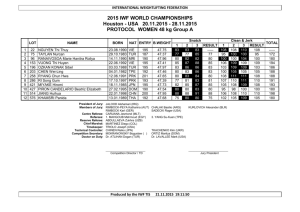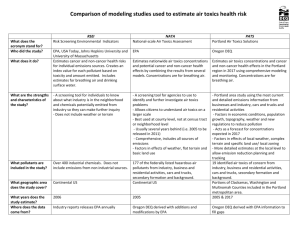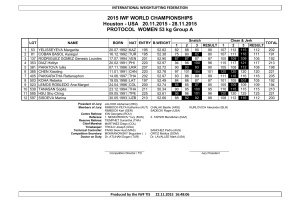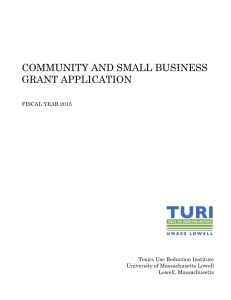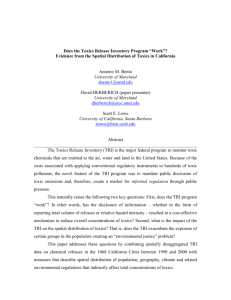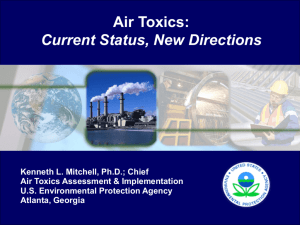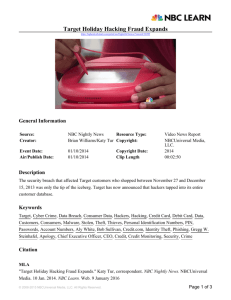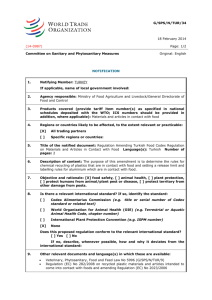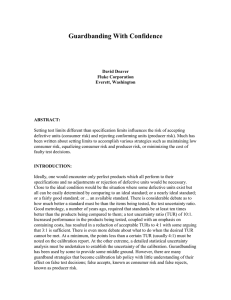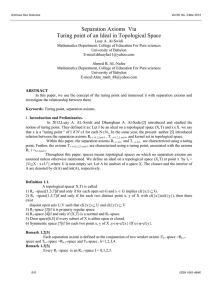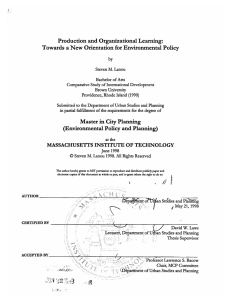Integrated Pest Mgmt., Nail Salons, Food Establishments
advertisement
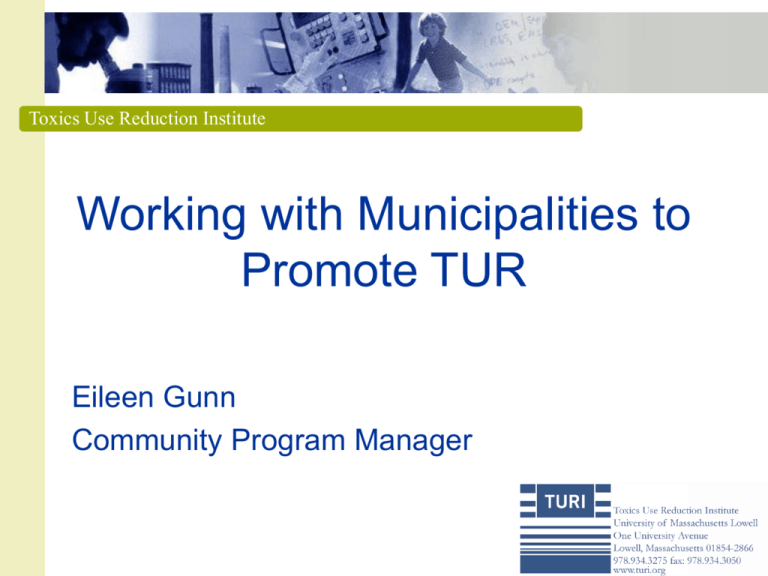
Toxics Use Reduction Institute Working with Municipalities to Promote TUR Eileen Gunn Community Program Manager Community Education Program Toxics Use Reduction Networking (TURN) Grant Program – Establish 1996 – 10k to municipalities and environmental/community organizations – X projects funded to date Community Website General Education and Outreach Goals Raise awareness about toxics and toxics use reduction strategies Train the trainer Promote model community projects for replication Create model policies and practices Create network of citizens/officials promoting TUR. Municipal Audiences Health Agents Boards of Health Department of Public Works Water Treatment Operators Schools Fire Departments Local Emergency Planning Commissions Police Conservation Commissions Affordable Housing Agencies How we work with Municipalities Education Training – Toxics,Toxics Use Reduction, Green Building, Integrated Pest Management, TUR in Food Establishments, Nail Salons, DPWs, Schools, Janitorial Cleaning Support Collaboration/Networking Provide technical resources (library, chemical research, laboratory) Grants Health Officials Training 1997 First Collaboration with Health Departments – Center for Ecological Technology trained Health Agents in TUR Several years with general trainings with Massachusetts Health Officers Association 2001? Survey of Interests (Integrated Pest Mgmt., Nail Salons, Food Establishments) Health Officials Training 2003 on-site municipal audit training for Health Officers (focus on DPWs) 200? Toxics in buildings, IAQ, green building opportunities with Boards of Health – Highlighted opportunities for TUR throughout their training manual 2004 Additional Nail Salon Training Special Trainings Created Pollution Prevention advanced course as part of Massachusetts Community Preservation Institute LEPC trainings on Emerging Issues in Toxics and Environmental Health Supporting Collaboration Newton Green Decade Coalition and Newton Board of Health Community education program on pesticides and alternatives Library resource center Newton adopted first Town Integrated Pest Management Policy Supporting Collaboration Marblehead ‘Living Lawn’ Demonstration Marblehead Pesticide Awareness Committee partnering with Health Department, Parks, Forestry and Recreation Department Community Pesticide Education Program Created Business Conference for Local Landscapers Simple Steps to a Living Lawn and Pesticide Brochures Built Demonstration Lawn Site Saturday Organic Lawn Care Classes Health Dept. requested assistance on an Organic Land Care Policy for Town-owned Property Supporting Collaboration Wellesley Pesticide Awareness Collaborative 2000-2001 Wellesley Health Department Required citizen/health agent partnership in each town Literature, displays, a web site, informational forums, guide for running a community education campaign 17 Health Departments mailed Pesticide Alerts and information on alternatives Supporting Collaboration Lexington Health Department 2002 TUR in Food Establishments Surveyed restaurants and schools on toxics used (mainly pesticides, disinfectants, cleaners) Identified opportunities to reduce toxics Developed Training Program Model IPM Plan for Food Establishments (regulation) TUR in Schools Milton Environmental Health and Safety Committee partnering w/ Milton BOH Motivation: Six new and renovated schools, Indoor Air Quality and Public Record Staff and Teacher Training EHS Policy Green Building Design Recommendations TUR in Schools Boston Public Schools, Multiple Grants Working with Staff, Custodial Union, MassCOSH and Boston Urban Asthma to promote green cleaners Previous TUR Walk-thrus with OTA and Staff and Teacher Training on Chemical Safety Vocational Cosmetology Lynn Rose and Western MassCOSH developing and piloting H&S Curriculum in Vocational Cosmetology Specific Modules for Hair Perming, Coloring, Bleaching, Artificial Nails, General Hazard Mapping Presented at State Vocational School Training Awareness Training on Nail Salon Hazards for Health Agents Statewide Healthy Cosmetology Committee Collaboration of state and local health officials, worker safety advocates and researches Goal is to promote awareness statewide Work with Board of Cosmetology Advance Safety Curriculum Develop Healthy Cosmo Website Continue Health Agent Trainings Green Building Promotion Healthy Homes - Affordable Homes, a Green Building Education and Demonstration Project, Pioneer Valley Project, Springfield, 2003, 04 Research on Alternative Building Materials and Availability English/Spanish trainings for homebuyers and Contractors Green Affordable Home Specifications Work with City Officials Green Building Promotion Somerville Green Building Project, Environmental Office and Health Department, 2004 Community Training (English and Portuguese) Community Brochures and website Collaboration with Climate Change Groups Successes Raising Awareness about Toxics and Toxics Use Reduction Techniques Increased networking on topics such as nail salons, pesticide use, janitorial products National networks beginning Successes Leveraging at Association level can be more effective – Buy in from Directors – Web/material dissemination – Annual conferences/training tracks – Incorporating TUR into their jobs – Individual town models still important – Encourage networking among model towns Engage Associations in Grant Review Successes Train-the-trainer Making the link between TUR and existing job responsibilities – Sanitary Code/IPM – Nuisance law/ TUR in Nail Salons – Fire Prevention/TUR in Nail Salons, Autobody shops Barriers/Challenges Competing Priorities – Homeland security focus of municipalities Regulatory nature of many municipal jobs Sustaining Projects beyond funding Institutionalizing TUR Barriers/Challenges Measuring success Providing specific information for so many audiences and topics Champion turnover Getting the word out on success stories to increase project replication www.turi.org/community
